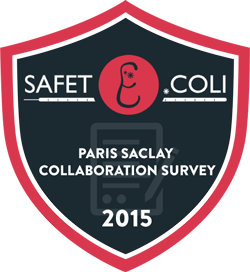Team:Toulouse/Collaboration
Meetups & Collaborations

One of the greatest opportunities offered by iGEM is to meet and work with scientists from all over the world, be it by leaning on previous professional work, or by collaborating with iGEM teams. You can read here about our interactions with other teams.
Meetups
KU Leuven
With the success of Exposciences
Midi-Pyrenées we were given the opportunity to participate in theInternational Exposciences
which took place in Brussels, Belgium, between the 19th and the 25th of July.
Taking advantage of our being in Brussels, we met four representatives of the iGEM KU Leuven team (Belgium).
For an entire afternoon, we exchanged views about our projects and particularly about the modeling part since our teams are using different softwares and methods. iGEM KU Leuven team uses (among others) the MatLab software whereas we use the Opflux software with the FBA (Flux Balance Analysis) and FVA (Flux Availability Analysis) methods.
This first meeting then evolved in a collaboration about modeling our projects.

Meet-up in Bordeaux - 29th/30th August
The French-speaking meet-up took place in Bordeaux on the 29th and the 30th of August. Numerous teams were represented there: Bordeaux, Paris Saclay, Paris Pasteur, Leuven (Belgium), EPFL (Switzerland), Aix-Marseille and our own team.

The program of this meet-up was very complete, from the discovery of Bordeaux through a tour of the city to the presentation of the projects and activities prepared by some of the teams present.
The presentations were held in a museum called CapSciences, dedicated to the popularization of science. We had to present our project both in French and English to a public composed of the other teams and non scientific people. It was very interesting to work on our communication skills and trying to find the balance between simplistic and still understandable by everyone. It was also a great opportunity to learn about other teams’ projects.

On Sunday, the two parisian teams had prepared activities. Paris Pasteur was a survey related to their subject. Paris Saclay offered us to reflect on biosafety applied to our projects. They helped us identify the potential dangers in our project and how we could act on them. Each team was filmed explaining its solution. You can find our own video here.

All in all this meet-up was a great chance to exchange and get to know other French-speaking teams. We would like to warmly thank the Bordeaux team for organizing it !
Collaborations
METU HS Ankara team - International data about Varroa
After some work on the project, we discovered that the team from METU High School in Ankara was working on the same subject as us, the fight against Varroa destructor, a dangerous parasite of the honeybee. We had a Skype conversation with them about the way we could help each other out

Based on their idea we decided to create a survey to be spread through Turkey and France in order to have a better idea of the extent of beehives’ infestation by varroas. Below are presented the results of this survey.
From France
We wish to underline the fact that in France there are few professional beekeepers, most of them are amateurs and own only a few hives. Thus there is no unity between these beekeepers, nor any syndicate. Hence the beekeepers that answered our survey were already interested in our project and aware of the problem caused by Varroa. We take this opportunity of thanking them for their participation and their help:
Matthieu Bourgeois, Michel Rives, François Sénéchal, Daniel Goubert, Lauras, Sébastien Bernard, Henri Martin, Marie Nadau, Michel Muller, Charlotte Bompard, Bruno Frémont, Gérard Corvée, Jean Rouquet.
As said previously, all beekeepers having answered the survey know about varroa and other ailments of the bees, such as American/European foulbrood, varroosis (caused by varroa), mycosis, chronic paralysis, nosema, sacced or chalk brood, deformed wings virus, colony collapse syndrome, acariosis or other dangers like the Asian hornet (a predator), pesticides or mold.
References

